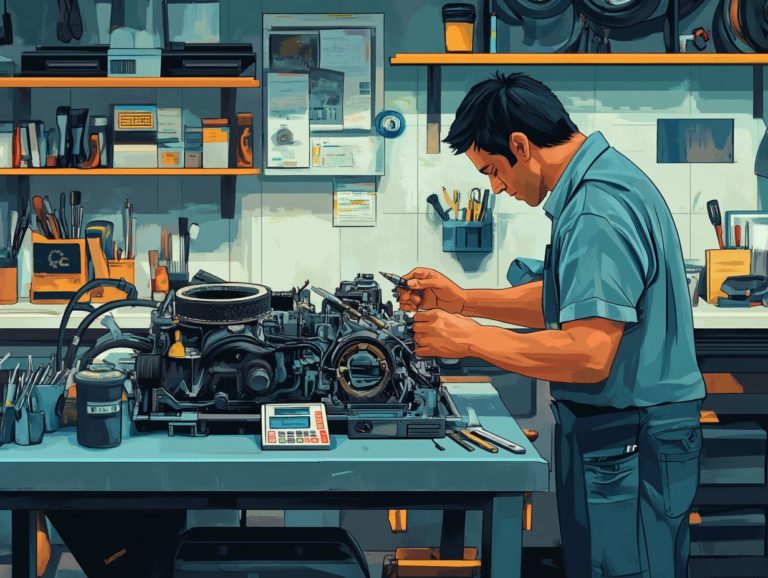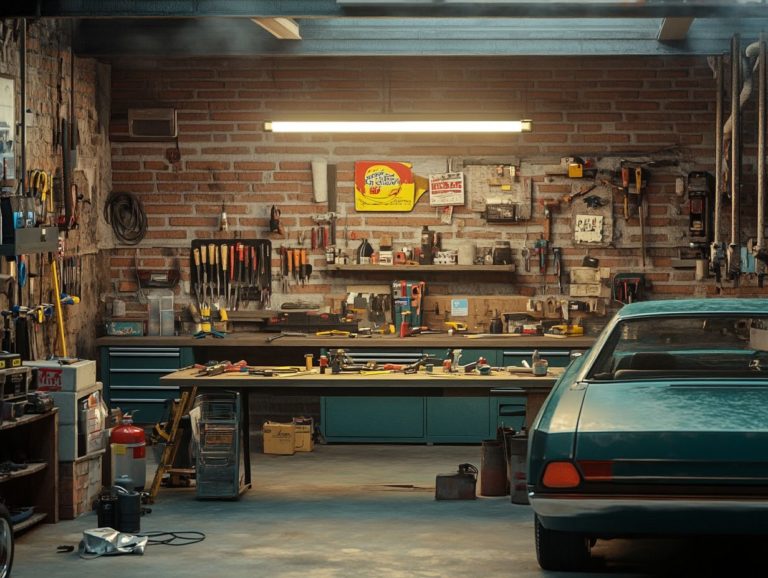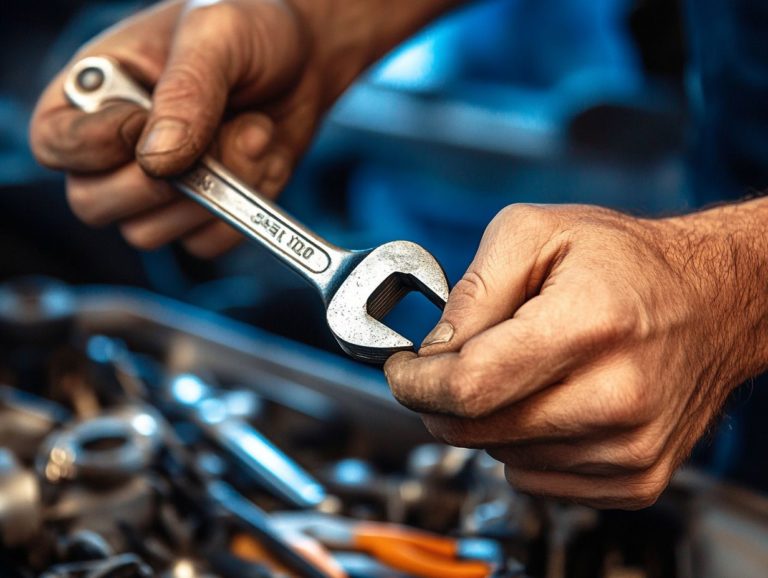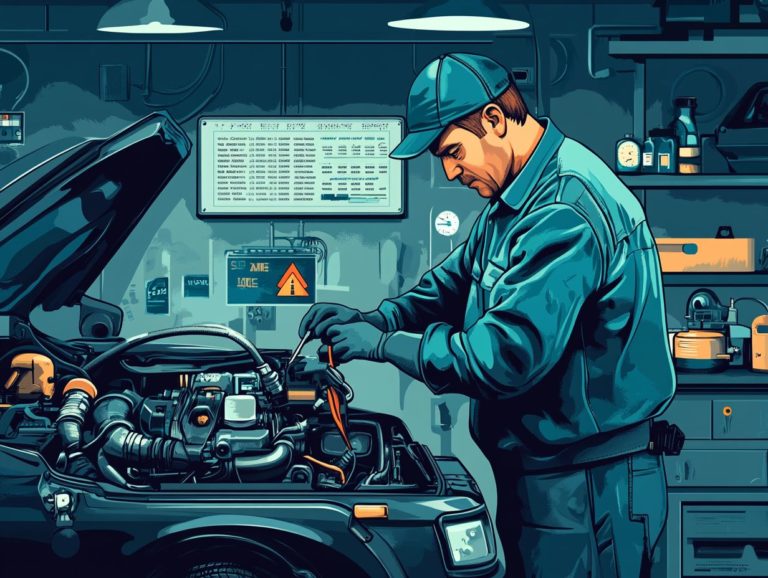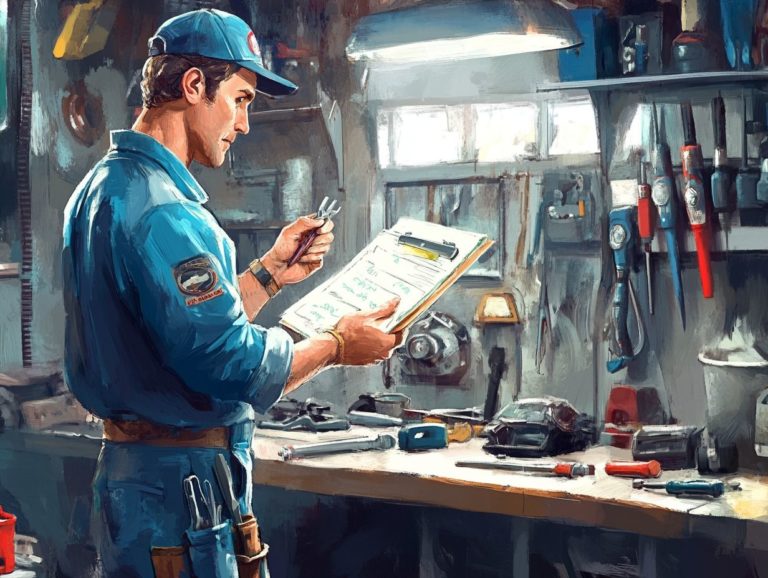5 Warning Signs Your Car Needs Immediate Repair
Every car owner understands the significance of regular maintenance, yet there are times when your vehicle sends unmistakable signals that something is amiss.
From unusual noises to persistent dashboard warning lights, these indicators may reveal underlying issues that warrant immediate attention. Turning a blind eye to them could lead to costly repairs or even compromised safety on the road.
This article delves into five critical warning signs that your car needs repair. It also shows how regular maintenance keeps your vehicle running well.
Stay with us for invaluable tips on maintaining your car s health and discovering a trustworthy mechanic!
Contents
- Key Takeaways:
- 1. Strange Noises or Vibrations
- 2. Difficulty Starting or Stalling
- 3. Warning Lights on the Dashboard
- 4. Leaking Fluids
- 5. Unusual Smells
- Why Is It Important to Address These Warning Signs?
- Frequently Asked Questions
- What are the 5 warning signs that my car needs immediate repair?
- What could be causing strange noises from my car?
- What should I do if a warning light comes on while I’m driving?
- Why is it important to address unusual vibrations in my car?
- What should I do if I notice fluid leaking from my car?
- What are some common reasons for my car to have difficulty starting or stalling?
Key Takeaways:
- Strange noises or vibrations indicate underlying issues and should be addressed.
- Difficulty starting or stalling can signal a failing engine.
- Warning lights on the dashboard signal serious problems and must not be ignored.
1. Strange Noises or Vibrations
Experiencing strange noises or vibrations while driving can be a red flag for possible engine problems or issues with various components. It s crucial to address these concerns promptly to avoid costly repairs and ensure your vehicle runs smoothly and safely.
For example, if you hear rattling sounds, that might indicate loose parts. Meanwhile, grinding noises could signal trouble with critical components like the fuel injector or transmission. Persistent squeaking sounds might mean that pulleys or serpentine belts vital for your engine’s operation are worn out. If those unusual noises don t go away, seeking help from a mechanic sooner rather than later is a wise move.
Regular vehicle maintenance is key to preventing these issues. It allows you to catch problems early and keep your vehicle in top shape, ultimately saving you both time and money in the long run.
2. Difficulty Starting or Stalling
If you’re having trouble starting your vehicle or it stalls frequently, it might be a sign of underlying engine problems that could lead to a loss of power and diminish overall performance. Don t wait! Get a professional mechanic to check your car right away.
Several potential culprits could be contributing to your frustration. Common problems often lie within the fuel system like clogged fuel filters or failing fuel pumps that impede proper fuel delivery to the engine.
Battery issues, like a drained or corroded battery, can leave you stranded. Meanwhile, ignition system concerns, such as worn spark plugs or faulty ignition coils, can interfere with your engine’s starting ability.
Before you head to the mechanic, check the battery’s condition, confirm you have enough fuel, and inspect the fuses. Doing so can save you time and help troubleshoot these issues effectively.
3. Warning Lights on the Dashboard
Dashboard warning lights, such as the check engine light or oil pressure light, act as vital indicators of your vehicle’s health. Ignoring these signals can lead to significant engine issues and costly repairs in the future.
These lights establish a direct line of communication between you and your vehicle, alerting you to potential problems that may not be immediately obvious. For example, that check engine light could indicate anything from a minor issue like a loose gas cap to a more serious complication such as a failing catalytic converter. Addressing these warnings promptly can prevent minor concerns from escalating into major repairs.
By seeking the expertise of certified technicians, you ensure a thorough diagnosis, allowing for the identification of underlying problems that could compromise your vehicle’s performance and efficiency over time.
4. Leaking Fluids

Fluid leaks beneath your vehicle can signal serious problems. Ignoring them may lead to engine trouble and expensive repairs.
Common types of leaks include:
- Coolant: Can cause overheating and severe engine damage.
- Brake fluid: Affects safety by compromising braking performance.
- Transmission fluid: May lead to slipping or shifting issues.
Each of these leaks can jeopardize your vehicle’s function. Address them without delay!
Regular maintenance checks for wear and tear and fluid levels can reduce leak risks. These proactive steps save money and help prevent dangerous situations on the road.
5. Unusual Smells
Notice a strange smell? Your car might be trying to tell you something critical! Experiencing unusual smells while driving, like burning odors or sweet-scented fumes, can be a red flag for serious issues such as smoke emission or overheating. Don t wait! Get your car checked out immediately!
Beyond these alarming indicators, you might also notice other odors. For instance, an acrid scent of burnt oil could signal an oil leak or engine trouble, which is not something to ignore. A sweet, syrupy smell might suggest coolant leaks that could lead to overheating if left unaddressed. Meanwhile, the unmistakable aroma of burnt rubber could indicate overheating brakes.
Tackling these issues promptly is crucial for your vehicle s safety. Seeking professional assistance can accurately diagnose these smells, helping you avoid costly repairs in the future.
Why Is It Important to Address These Warning Signs?
Addressing warning signs like strange noises, leaks, or dashboard alerts is essential for maintaining your vehicle’s health and safety. Ignoring these indicators could lead to serious engine issues, high repair costs, and a compromised driving experience.
If you fail to respond, you risk a major engine breakdown, which could leave you stranded and facing exorbitant repair bills. Overlooking these issues creates safety hazards not just for you, but for everyone on the road, as malfunctioning components can jeopardize braking and steering systems.
Regular vehicle maintenance think oil changes and fluid checks is vital for extending your vehicle s lifespan. Rely on expert car mechanics; they can identify and resolve potential problems before they escalate, ensuring a smoother, safer ride.
What Are the Potential Consequences of Ignoring These Signs?
Ignoring warning signs can lead to serious consequences, such as significant damage to your engine components, a greater likelihood of expensive repairs, a loss of power while driving, and increased risks to your safety on the road.
Consider a small coolant leak that you overlook; it can quickly turn into an overheating engine, resulting in costly repairs and putting lives at risk if your vehicle suddenly loses power on a busy highway.
Neglecting transmission issues may culminate in complete transmission failure, drastically impairing your control over the vehicle and potentially causing accidents.
These scenarios highlight the necessity of heeding warning signs, as they serve as vital indicators to help you prevent more severe problems down the road.
How Can Regular Maintenance Help Prevent These Issues?

Regular vehicle maintenance is essential. It helps prevent issues like engine trouble, declining performance, and poor fuel efficiency.
Practices like routine oil changes, brake inspections, and engine diagnostics keep your car in peak condition. These proactive measures extend the lifespan of vital components and boost your safety.
Trust qualified technicians to spot problems early. Their expertise helps you avoid costly repairs and keeps your vehicle performing optimally.
What Are Some Common Causes of These Warning Signs?
Common warning signs like unusual noises, fluid leaks, and dashboard alerts can signal various problems, including engine issues and brake failures. Additionally, be aware of signs your tires need immediate attention. Addressing these signs promptly is crucial for your vehicle’s health.
For example, poor fuel economy may indicate your engine isn’t running efficiently, leading to serious damage if ignored.
Fluid leaks can indicate system failures. Don’t overlook them, as repairs can be costly.
Worn brake pads or low fluid levels can seriously impact your driving safety. It’s essential to address these concerns quickly.
Acting swiftly upon these warning signs is vital for your vehicle’s longevity and your safety on the road.
How Can One Find a Reliable Mechanic for Car Repairs?
Finding a reliable mechanic is crucial for great service. Look for factors like certifications, customer reviews, and experience with your vehicle type.
Research local shops. Seek businesses with reputable certifications that show their mechanics have received proper training.
Read online testimonials to gauge past customer satisfaction. Also, asking friends and family for recommendations can lead you to trustworthy professionals.
Once you find a mechanic you trust, maintain that relationship. This helps them understand your vehicle s history for better ongoing care.
What Are Some Tips for Maintaining a Car’s Health?
Maintaining your car requires a proactive approach. Focus on regular maintenance, monitoring fuel efficiency, and timely engine diagnostics.
Conduct routine inspections and keep an eye on fluid levels to catch issues early. Following your manufacturer’s service schedule is vital for your car’s performance.
Simple tasks like checking tire pressure and rotating tires can extend their lifespan. Regular brake checks enhance your safety.
Adopting these practices helps prevent costly repairs while improving your vehicle’s reliability and overall driving experience.
Frequently Asked Questions

What are the 5 warning signs that my car needs immediate repair?
The five warning signs of common engine problems are strange noises, warning lights on the dashboard, unusual vibrations, leaking fluids, and difficulty starting or stalling. Recognizing these could save you from an accident!
What could be causing strange noises from my car?
Strange noises can indicate issues like a worn-out belt or loose parts. If you hear something unusual, don t ignore it!
What should I do if a warning light comes on while I’m driving?
Pull over safely and check your owner’s manual. If it s a serious issue, get your car to a mechanic immediately!
Why is it important to address unusual vibrations in my car?
Unusual vibrations might signal serious problems like tire imbalance or suspension damage. Ignoring them could lead to costly repairs or unsafe driving conditions!
What should I do if I notice fluid leaking from my car?
Immediately pull over and check the color and consistency of the fluid. Different colors may indicate different issues, and it s crucial to get a mechanic involved for diagnosis and repair.
What are some common reasons for my car to have difficulty starting or stalling?
Difficulty starting or stalling might stem from a bad battery or a clogged fuel filter. A mechanic can help determine the exact cause and get you back on the road quickly!

